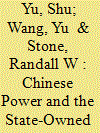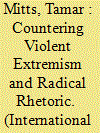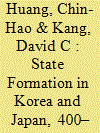|
|
|
Sort Order |
|
|
|
Items / Page
|
|
|
|
|
|
|
| Srl | Item |
| 1 |
ID:
183776


|
|
|
|
|
| Summary/Abstract |
Foundational theories of trade politics emphasize a conflict between consumer welfare and protectionist lobbies. But these theories ignore other powerful lobbies that also shape trade policy. We propose a theory of trade distortion arising from conflict between consumer welfare and importer lobbies. We estimate the key parameter of the model—the government's weight on welfare—using original data from Venezuela, where Hugo Chávez used an exchange-rate subsidy to underwrite hundreds of billions of dollars of imports. Whereas estimates from traditional models would make Chávez look like a welfare maximizer, our results indicate that he implemented distortionary commercial policy to the benefit of special interests. Our analysis underscores the importance of tailoring workhorse models to account for differences in interest group configuration. The politics of trade policy is not reducible to the politics of protectionism.
|
|
|
|
|
|
|
|
|
|
|
|
|
|
|
|
| 2 |
ID:
183780


|
|
|
|
|
| Summary/Abstract |
China has become a leading source of outward foreign direct investment (FDI), and the Chinese state exercises a unique degree of influence over its firms. We explore the patterns of political influence over FDI using a comprehensive firm-level data set on Chinese outward FDI from 2000 to 2013. Using six country-level measures of affinity for China, we find that state-owned and globally diversified firms appear to conform most closely to official guidance. Official investment directives and state visits link investments to state policies; Taiwan recognition and Dalai Lama meetings anchor our political interpretations; and UN General Assembly voting and temporary UN Security Council membership suggest that this intervention may be systematic. The results are robust to country, year, and sector fixed effects, and most do not hold for private or small firms. The results suggest that China uses FDI by prominent state-owned enterprises as an instrument to promote its foreign policy.
|
|
|
|
|
|
|
|
|
|
|
|
|
|
|
|
| 3 |
ID:
183774


|
|
|
|
|
| Summary/Abstract |
Governments interact strategically with sovereign bond market creditors: they make choices not only about how often and how much to borrow, but also under what terms. The denomination of debt, in domestic or foreign currency, is a critical part of these terms. The “original sin” logic has long predicted that creditors have little appetite for developing-country government debt issued in domestic currency. Our novel data, including bond issues by 131 countries in 240,000 primary market transactions between 1990 and 2016, suggest otherwise. Domestic-denominated bonds have come to dominate the market, although domestic-currency issuance often is accompanied by shorter bond maturities. We argue that ideologically rooted policy preferences play an important role in this unexpected trend in denomination. All else equal, right governments choose foreign denomination as a means of mitigating currency risk and thus minimizing borrowing costs. In contrast, left governments opt for the flexibility of domestic denomination, and they are better able to act on their preferences in the presence of risk-mitigating monetary institutions and macroeconomic stability. We find support for our argument that partisanship has a robust and enduring relationship with denomination outcomes, even in a marketplace in which domestic-denominated developing-country sovereign bonds have become the norm.
|
|
|
|
|
|
|
|
|
|
|
|
|
|
|
|
| 4 |
ID:
183781


|
|
|
|
|
| Summary/Abstract |
How do extremist sympathizers respond to counter-radicalization efforts? Over the past decade, programs to counter violent extremism have mushroomed around the world, but little is known of their effectiveness. This study uses social media data to examine how counter-radicalization efforts shape engagement with extremist groups in the online world. Matching geolocated Twitter data on Islamic State sympathizers with granular information on counter-extremism activities in the United States, I find that, rather than deradicalizing, these efforts led Islamic State sympathizers to act strategically to avoid detection. After counter-extremism activities, the group's supporters on Twitter who were in the vicinity of these events began self-censoring expressions of support for the Islamic State, altered profile images and screen names, and encouraged followers to migrate to Telegram, an encrypted network not viewable by the public. These findings reveal previously unknown patterns in the effects of counter-extremism programs in the digital era.
|
|
|
|
|
|
|
|
|
|
|
|
|
|
|
|
| 5 |
ID:
183779


|
|
|
|
|
| Summary/Abstract |
There is increasing agreement that states and other political actors on the world stage sometimes achieve international authority. However, there is less agreement about the nature and functioning of international authority relations. What determines whether an actor will be recognized as an authoritative actor? And what are the effects thereof? In this essay, we identify four distinct conceptions of authority in the study of international relations: authority as contract, authority as domination, authority as impression, and authority as consecration. Consideration of the typology leads to two important insights. First, the phenomenon of authority has an essentially experiential dimension. Subordinate actors’ emotional experience of authority determines their response to authority and thus also has a fundamental impact on the stability of authority. Second, the emergence of forms of international authority does not entail, at least not necessarily, the weakening of the sovereignty of states, but can equally be argued to strengthen it.
|
|
|
|
|
|
|
|
|
|
|
|
|
|
|
|
| 6 |
ID:
183778


|
|
|
|
|
| Summary/Abstract |
Cooperation among militant organizations contributes to capability but also presents security risks. This is particularly the case when organizations face substantial repression from the state. As a consequence, for cooperation to emerge and persist when it is most valuable, militant groups must have means of committing to cooperation even when the incentives to defect are high. We posit that shared ideology plays this role by providing community monitoring, authority structures, trust, and transnational networks. We test this theory using new, expansive, time-series data on relationships between militant organizations from 1950 to 2016, which we introduce here. We find that when groups share an ideology, and especially a religion, they are more likely to sustain material cooperation in the face of state repression. These findings contextualize and expand upon research demonstrating that connections between violent nonstate actors strongly shape their tactical and strategic behavior.
|
|
|
|
|
|
|
|
|
|
|
|
|
|
|
|
| 7 |
ID:
183773


|
|
|
|
|
| Summary/Abstract |
State formation occurred in Korea and Japan 1,000 years before it did in Europe, and it occurred for reasons of emulation and learning, not bellicist competition. State formation in historical East Asia occurred under a hegemonic system in which war was relatively rare, not under a balance-of-power system with regular existential threats. Korea and Japan emerged as states between the fifth and ninth centuries CE and existed for centuries thereafter with centralized bureaucratic control defined over territory and administrative capacity to tax their populations, field large militaries, and provide extensive public goods. They created these institutions not to wage war or suppress revolt: the longevity of dynasties in these countries is evidence of both the peacefulness of their region and their internal stability. Rather, Korea and Japan developed state institutions through emulation and learning from China. The elites of both copied Chinese civilization for reasons of prestige and domestic legitimacy in the competition between the court and the nobility.
|
|
|
|
|
|
|
|
|
|
|
|
|
|
|
|
| 8 |
ID:
183775


|
|
|
|
|
| Summary/Abstract |
While the firm-level distributional consequences of market liberalization are well understood, previous studies have paid only limited attention to how variations in domestic institutions across countries affect the winners and losers from opening up to trade. We argue that the presence of coordinated wage-bargaining institutions, which impose a ceiling on wage increases, and state-subsidized vocational training, which creates a large supply of highly skilled workers, generate labor market frictions. Upward wage rigidity, in particular, helps smaller firms weather the rising competition and increasing labor costs triggered by trade liberalization. We test this hypothesis using a firm-level data set of European Union countries, which includes more than 800,000 manufacturing firms between 2003 and 2014. We find that, for productive firms, gains from trade are 20 percent larger in countries with liberal market economies than they are in coordinated market economies. Symmetrically, less productive firms in coordinated market economies experience significantly smaller revenue losses compared to liberal market economies. We show that both the presence of an institutionalized wage ceiling and the availability of subsidized vocational training are key mechanisms for reducing the reallocation of revenue from unproductive to productive firms in coordinated market economies compared to liberal market economies. In line with our theory, we find that wages and employment in liberalized industries increase differentially across both types of labor markets. Finally, we provide suggestive evidence that trade liberalization triggers a differential demand for redistribution at the individual level across different labor markets, which is in line with our firm-level analysis.
|
|
|
|
|
|
|
|
|
|
|
|
|
|
|
|
|
|
|
|
|